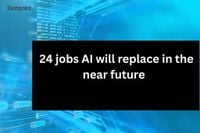As artificial intelligence (AI) technology continues to advance, it is reshaping the job market in unprecedented ways. A recent report by McKinsey highlighted that generative AI could automate between 60% to 70% of employee workloads, a statistic that has raised alarms across various industries. In May 2023 alone, nearly 4,000 job cuts were attributed to AI, according to Challenger, Gray & Christmas Inc. Furthermore, OpenAI estimated that 80% of U.S. workers would see at least 10% of their tasks affected by large language models (LLMs). This shift is not just a distant possibility; it is happening now, and its implications are profound.
AI is no longer a futuristic concept; it has already infiltrated workplaces, transforming roles and responsibilities. From customer service chatbots taking over call center jobs to AI tools managing legal research and creative writing, the job market is undergoing a seismic shift. The question is no longer whether AI will replace jobs, but rather how quickly and deeply it will alter industries. While some professions may thrive alongside AI, others are facing extinction.
This article aims to outline the 24 jobs most at risk of being replaced by AI, providing insights that can help individuals make informed career decisions. Understanding which roles are vulnerable is crucial for anyone looking to navigate the future of work effectively.
Jobs that involve predictable and rule-based tasks are at the highest risk of replacement. For instance, data entry clerks have a staggering 95% likelihood of being automated. AI systems can process vast amounts of data with unmatched speed and accuracy, rendering human data entry obsolete. Similarly, telemarketers face a 90% replacement likelihood as AI chatbots and virtual sales agents become more sophisticated.
Assembly line workers, who traditionally perform repetitive manufacturing tasks, are also at risk, with an 85% likelihood of being replaced. AI-driven robotic systems can perform intricate tasks with precision and operate continuously, minimizing the need for human labor. Customer service representatives are not immune either, with an 80% chance of being automated as AI chatbots provide round-the-clock support.
Retail cashiers and inventory managers are similarly vulnerable, with replacement likelihoods of 85% and 75%, respectively. AI-powered systems like Amazon Go have already demonstrated the feasibility of cashierless shopping, while predictive analytics tools are optimizing inventory management with remarkable accuracy.
Basic administrative roles, travel agents, paralegals, financial clerks, and loan officers are also on the chopping block, with replacement likelihoods ranging from 60% to 75%. The automation of these positions is driven by AI's ability to analyze data, manage schedules, and even generate legal documents with efficiency that surpasses human capabilities.
While the threat of job loss is real, it is essential to recognize that AI is not merely a job eliminator; it is also a job creator. As AI takes over mundane tasks, new roles are emerging that require human creativity, emotional intelligence, and complex decision-making. For instance, AI and automation specialists, prompt engineers, and cybersecurity experts are in high demand as companies navigate this new landscape.
Moreover, the shift toward human-AI collaboration is becoming increasingly evident. AI-powered tools can enhance productivity by assisting professionals in various fields, from healthcare to finance. For example, doctors can leverage AI to diagnose diseases more accurately, while writers can use AI to generate ideas and improve their work.
However, the reality is that many workers will need to adapt to remain competitive in an AI-driven world. Upskilling and continuous learning are crucial for those looking to future-proof their careers. Emphasizing tech literacy, critical thinking, creativity, and emotional intelligence will be vital as workers navigate this evolving landscape.
As AI continues to reshape the workforce, the implications for job seekers are significant. Understanding the potential risks and opportunities associated with AI will be crucial for individuals looking to thrive in the future job market. Workers must embrace change, develop future-proof skills, and remain adaptable to ensure their relevance in an increasingly automated world.
In conclusion, while AI presents challenges, it also offers opportunities for growth and innovation. Those who are proactive in adapting to these changes will find themselves well-positioned to succeed in the evolving landscape of work.

